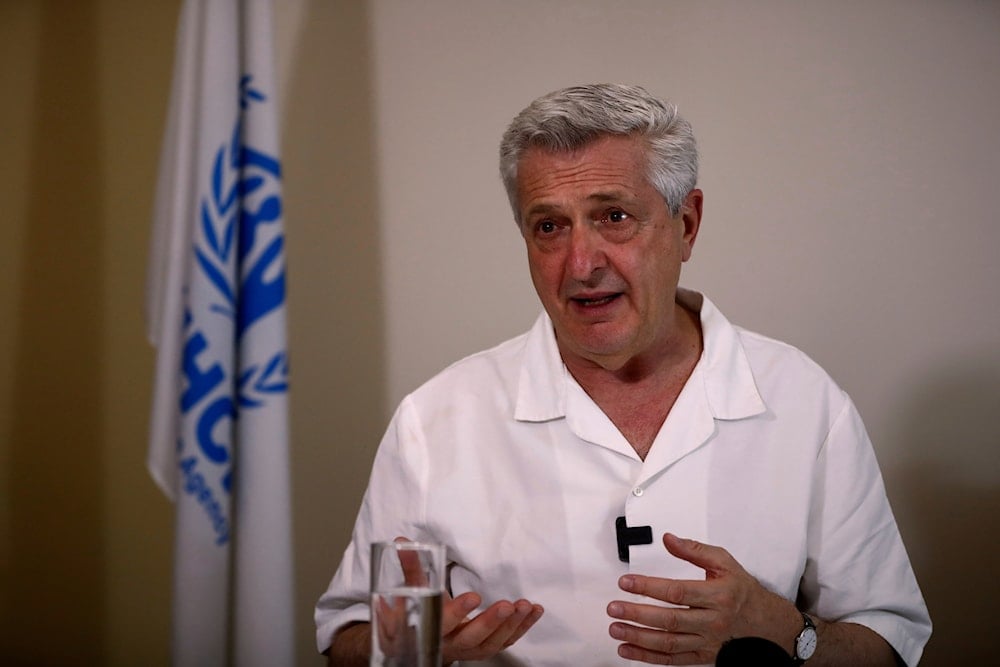UN refugee chief warns aid cuts are fueling migration surge to Europe
In an interview for the Financial Times, Filippo Grandi warns that slashed aid budgets are driving Sudanese refugees toward Europe, urging support for frontline host countries.
-

UN refugee agency (UNHCR) chief Filippo Grandi talks to the Associated Press in Damascus, Syria, Friday, June 20, 2025 (AP)
The UN’s top refugee official has warned that severe funding cuts to humanitarian programs are driving increased migration toward Europe, urging EU leaders to invest in on-the-ground asylum systems in Africa instead of pursuing controversial offshore models.
In an interview for the Financial Times, Filippo Grandi, the UN High Commissioner for Refugees, said dwindling international support for Sudanese refugees is forcing many to head north toward Europe, rather than staying in Sudan or neighboring Chad, countries that had previously offered them protection.
“The budget cuts that are imposed on us by donors are catastrophic, also from the point of view of how you manage these flows,” Grandi said, calling Europe’s disengagement from African crises “a big strategic mistake.”
He noted that Sudanese refugees are already moving from Chad to Libya, one of the main migration corridors to Europe.
Grandi appeals for support in host countries
Grandi emphasized the importance of supporting countries that are already hosting large refugee populations. “Give more assistance to states where people are ready to stay before going back home. You solve a lot of your problems by doing that,” he said.
The UNHCR’s operations have suffered severe financial strain after US President Donald Trump slashed Washington’s contribution from $2 billion to just $390 million this year. European countries, including France, Germany, and Italy, have also reduced funding, further exacerbating the crisis. The agency has since laid off a third of its staff and suspended $1.4 billion worth of humanitarian programs.
With growing asylum backlogs and political pressure to curb immigration, several EU member states are pushing to shift parts of their asylum systems outside the bloc. Plans include processing applicants in African nations, a move driven by hardline governments in Denmark and Italy.
Previous efforts, such as the UK’s plan to establish refugee centers in Rwanda, collapsed amid legal challenges and human rights concerns.
Investing in existing systems a ‘better bet’
Grandi argued that investing in refugee-hosting nations would yield better results than setting up new asylum infrastructures abroad. He expressed concern over increasing migration via Libya and cautioned against deepening ties with unstable or abusive actors in the region.
While the EU is negotiating migration deals with African countries and proposing so-called “return hubs” for rejected asylum seekers, such strategies face legal and logistical hurdles.
Grandi said the UNHCR is open to collaborating on external asylum procedures, “if proper safeguards were in place,” including ensuring European governments retain responsibility for those seeking asylum.
“If it is dumping the responsibilities of people that are seeking asylum in Europe entirely on the country selected, then I think it would be a bit more problematic,” he noted. “If it is helping out with a system that offers sufficient guarantees and respect of international law, maybe yes.”
But he warned that few countries would be willing to host such schemes. “I’m not very optimistic that you have countries queuing up.”
Troubled prospects in Libya, Tunisia
Grandi also flagged difficulties in working with some of the governments the EU is courting. Libya, he said, is “not a country where we could have such an arrangement.” Meanwhile, Tunisia, despite signing a migration deal with the EU, has barred the UNHCR from screening asylum applicants, amid reports of forced returns to Libya and Algeria.
“We know that there’s been pushbacks [of migrants] to Libya, to Algeria, and that there is a difficult environment for refugees and migrants,” he said.
Grandi urged European governments to engage with the UNHCR before implementing offshore asylum plans. “Consult with us when you are elaborating. There are windows of opportunity to do some of these innovative things,” he advised, cautioning that any new approach must comply with international law.

 4 Min Read
4 Min Read










